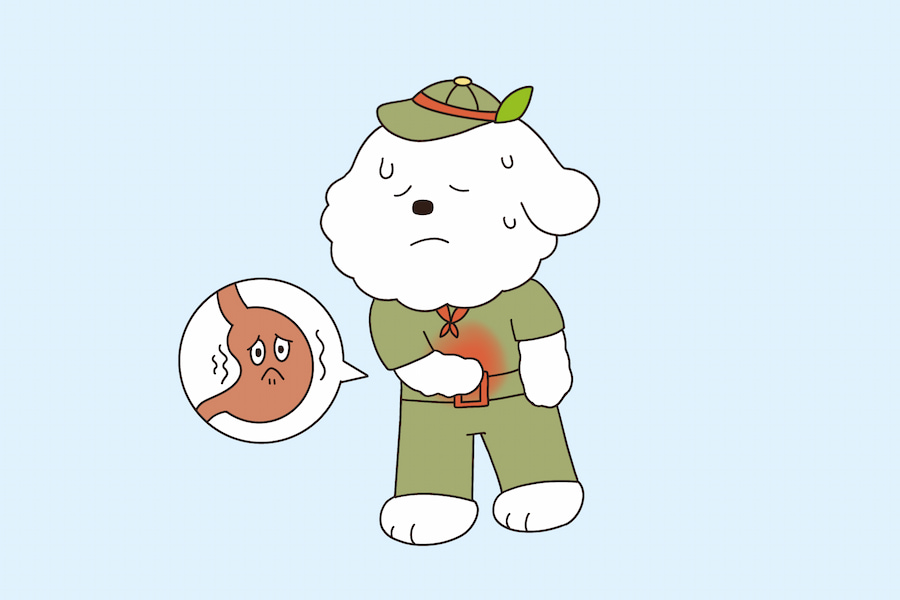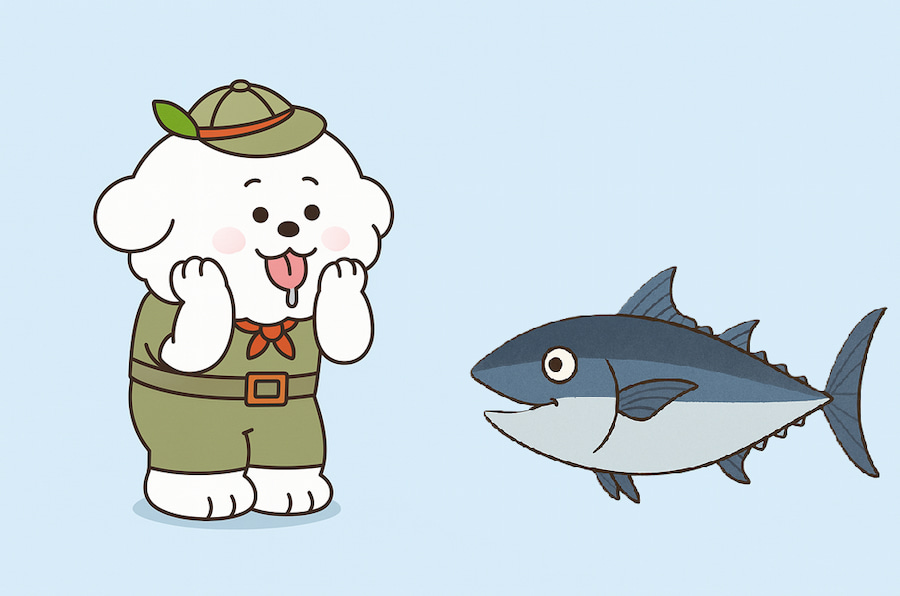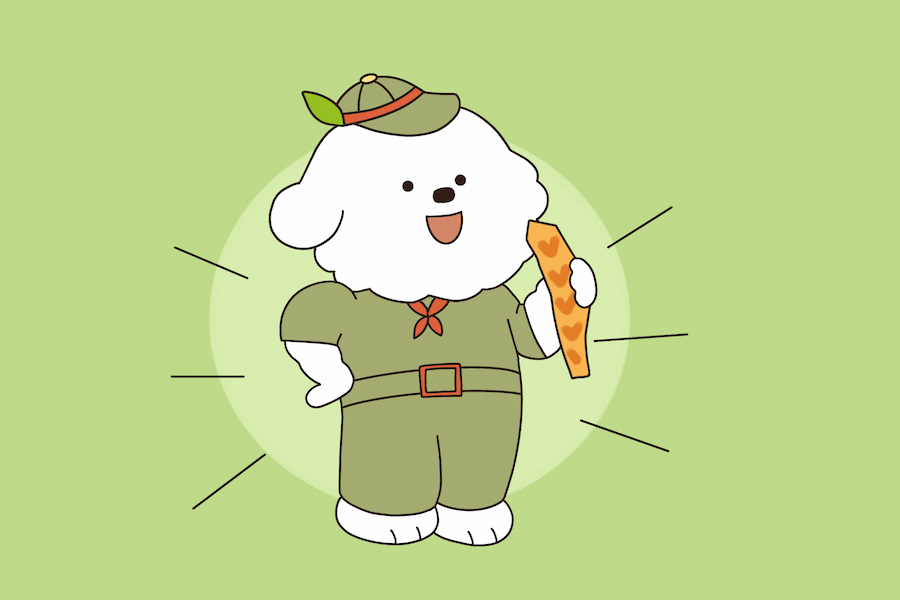Dogs’ dietary requirements and tastes start to change as they approach their senior years. Once simple for them to chew and digest, treats may now be more difficult to enjoy—especially if dental problems exist. Maintaining the health and quality of life of senior dogs depends on proper treats. Many senior dogs have dental problems; hence the finest senior dog treats should be not only healthy but also mild on their teeth and gums. The greatest natural treat alternatives will be discussed in this article along with a discussion on why softer treats are good for seniors and how to choose the correct ones for your aging friend.

Lee&Pol offers the best homemade dog treats for senior dogs by thoroughly removing salt and bones from dried pollock over 24 hours!
When is a Dog Considered a Senior?
Though the timeline can vary based on breed and size, most dogs are considered seniors by the age of 7. However, this classification can differ across breeds. Smaller breeds like Chihuahuas and Dachshunds may not enter their senior years until they are around 10 years old, while larger breeds such as Great Danes often reach senior status as early as 6.

The life expectancy of a dog significantly influences when it is categorized as a senior. Larger breeds generally have shorter lifespans, making them senior earlier than smaller breeds with longer life expectancies.
Characteristics of Senior Dogs
As dogs age, they undergo physiological and behavioral changes that affect their health and overall well-being. Below are the most common characteristics of senior dogs.
Weakened Teeth and Gums
Dogs’ declining oral health is among the most obvious indicators of ageing. Gum disease, teeth decay, and even tooth loss are common afflictions for senior canines. These dental problems may make hard food chewing challenging for them.

Older dogs’ poor dental hygiene may also cause infections, foul breath, and unwillingness to eat, therefore influencing their nutrition and quality of life.
Senior dogs should have frequent dental visits to help with these problems and may benefit from softer diets that call for less chewing effort. Good dental care—that is, cleaning their teeth and using suitable chew toys—helps to extend the life of their teeth and gums.
Weaker Digestive Systems
Older dogs find it more difficult to absorb vital nutrients since their digestive systems often grow less effective. Often resulting from this decreased efficiency, are gastrointestinal issues like indigestion, bloating, vomiting, diarrhea, and constipation. Many older dogs acquire dietary sensitivities or intolerances not present in their early years, which might call for a specific diet.
Owners should think about providing dogs premium, readily digested diets with enough fiber to maintain gut health when their digestive systems decline. Track how their nutrition influences their general digestive performance and stool consistency.

Decreased Mobility and Joint Pain
As dogs age, their joints and muscles weaken, leading to reduced mobility. Arthritis is a common issue among senior dogs, especially larger breeds, which can cause joint pain and stiffness. This condition makes it difficult for them to engage in physical activities that they once enjoyed.
Joint supplements containing glucosamine and chondroitin can help manage joint pain and improve mobility. Maintaining a healthy weight through a balanced diet and appropriate exercise is crucial for minimizing the stress on their joints.

Regular low-impact activities, like swimming and short walks, can also help keep senior dogs active without exacerbating their joint problems.
Changes in Energy Levels and Sleep Patterns
Dogs naturally lose energy as they age. Senior dogs often sleep more, rest more, and show reduced degrees of physical activity. Some canines could have erratic sleep habits, including sleeping more during the day and become restless at night. This drop in energy and erratic sleep might also be a symptom of underlying medical conditions like cognitive decline or discomfort from joint problems.
Senior dogs may remain active and happy by keeping a consistent schedule and getting mental stimulation from mild activities.

What Can I Give My Senior Dog to Eat?
Generally speaking, senior dogs have different nutritional requirements than younger canines. Their meals should be changed to fit dental problems, lower energy levels, and worse digestion. These are some advised dietary adjustments and food choices for senior dogs.
Soft Kibble and Wet Food
Many older dogs find it difficult to chew hard kibble because of weak teeth and gums. A mild substitute is softened kibble, or wet food, soaked in broth or water. Apart from a softer texture, wet food sometimes has more moisture content, which helps hydration.

By adding water or broth, owners may wet dry kibble so that older dogs may chew easier but still maintain flavor and nutrition.
Lean Proteins
Senior dogs could need less calories to maintain a good weight as they become less active. Easy to digest and devoid of too much fat, lean proteins like dried pollock,chicken, and turkey provide vital nutrients. For dogs with joint issues specifically, high-protein diets assist preserve muscle mass while reducing needless weight increase.

Dried pollock is low in fat and rich in protein. The protein in dried pollock is easy to digest, making it suitable for senior dogs with weaker digestive system.
Vegetable Purees
A senior dog’s diet would benefit much from purees or mashed veggies like sweet potatoes, carrots, beets, and green beans and fruits like pineapples, mangoes, strawberries. Low in calories but high in fiber, these veggies support digestive health. Especially for dogs with delicate stomachs, pureeing the veggies guarantees they are easily consumed and broken down.
Vegetables and fruots also provide important vitamins A and C, which boost immune system and general health in senior dogs.
Moisture-Rich Foods
Older dogs are more likely to get dehydrated, which aggravates renal problems. Giving them foods high in moisture, such as wet dog food or adding water to their meals guarantees their hydration. Extra hydration may also come from high water content fruits and vegetables such cucumbers, watermelon and zucchini.

Senior dogs with compromised kidneys particularly need on hydration, hence adding more moisture in their food helps avoid urinary tract issues.
Foods Rich in Omega-3 and Glucosamine
Adding foods high in omega-3 fatty acids and glucosamine to your senior dog’s diet can help lower inflammation and improve joint health. Found in fish oil, omega-3s have anti-inflammatory effects that may aid arthritic symptoms be lessened and general skin and coat condition is improved.
Often supplemented via supplements, glucosamine helps senior dogs retain cartilage and ease joint discomfort, therefore increasing their mobility.
Smaller, More Frequent Meals
Smaller, more frequent meals may help senior dogs with diminished appetites or problems breaking down big meals. This method guarantees a consistent flow of energy throughout the day and helps avoid digestive disorders like bloating. Smaller amounts help simplify their ageing digestive tract, which improves nutrient absorption.
Senior dogs also could benefit from smaller quantities of protein distributed across the day instead of one big meal.

Lee&Pol combines low-fat, high-protein dried pollock rich in omega-3 with fiber-rich fruits and vegetables to create the perfect healthy treats for senior dogs!
Best Senior Dog Treats
Simple ingredients like dry pollack, fruits, and vegetables—which provide outstanding amounts of vitamins and minerals—can be used to create several healthful and nutritious treats for older dogs that are easy on their digestive systems. Here are a few of the greatest choices recognized by veterinaries.
Dried Pollock
Among the finest natural treats available for senior dogs is dried pollock. It’s a great source of lean protein, which helps maintain muscle mass—critical for senior dogs who often lose muscle as they get older. Strong anti-inflammatory action of Pollack’s omega-3 fatty acids may help ease joint discomfort, enhance skin health, and promote cognitive ability. Senior dogs who could have arthritis or other movement problems will find this very helpful. Its smooth texture also guarantees dogs with dental issues simple consumption when dried correctly.
Apples
Apples are heavy in dietary fiber, which promotes good digestion and may help senior dogs avoid constipation—a frequent problem. These also abound in vitamins A and C, which strengthen the immune system and support coat and skin condition. As long as the apple is cut correctly and the seeds are removed—since apple seeds contain cyanide, which is poisonous to dogs—the crisp texture may assist clean teeth. Senior dogs that have to control their weight will find apples perfect as they are also low in calories.
Blueberries
Antioxidants, especially vitamin C and flavonoids, are heavily found in blueberries. These antioxidants help protect cells from harm. Antioxidants are really helpful for senior dogs since they may lower inflammation, have anticarcinogenic effects, maintain brain function, and even slow down cognitive loss in senior dogs. Senior dogs will find them modest in size simple to chew, and in warmer months they may even be frozen for a crisp, refreshing treat.
Seedless Watermelon
With a high-water content—over 9%—watermelon is a great hydrative fruit. Senior dogs that may not drink as much water as they should or those prone to dehydration will find this very helpful. Along with potassium, which helps control hydration and maintains appropriate muscular activity, watermelon is also rather low in calories and offers vital vitamins like A, B6, and C. During the hot summer, it is perfect for senior dogs; it is pleasant, and reviving.

Just be cautious to cut out the seeds and rind as these could irritate digestion.
Bananas
Gentle on the stomach, bananas provide a healthy supply of potassium, which promotes muscular health and heart function. High in fiber, these fruits may assist a senior dog’s digestive tract be more regulated, therefore lowering their constipation risk. Magnesium found in bananas also promotes food absorption and bone strength. Dogs with dental issues will find its soft texture easy-to-chew.
Carrots
Carrots are high in beta-carotene, which is converted to vitamin A in the body and is essential for maintaining healthy eyesight, especially as dogs age. For senior dogs prone to cataracts or other eye issues, this can be particularly beneficial. The fiber in carrots also helps promote regular bowel movements.

These are also low in calories and can be given raw for a crunchy snack or steamed for senior dogs with dental problems.
Kabocha Squash
Kabocha squash is a highly digestible food. Due to its richness in fiber, it helps regulate digestion and improves stool consistency. It’s particularly useful for dogs experiencing constipation or diarrhea, both of which are common problems in older dogs. It also contains antioxidants and vitamins like A and C, which contribute to skin and coat health and immune support.

Kabocha squash is also rich in potassium, which aids in muscle function, and its smooth texture makes it easy to incorporate into soft treats or mix with kibble for senior dogs.
Sweet Potatoes
Sweet potatoes are an excellent source of nutritional fiber. Additionally, they also include vital minerals like potassium, vitamins B6 and C, and beta-carotene. While the vitamins boost a robust immune system and good skin, fiber aids with digestive health. Natural softness of sweet potatoes makes chewing and digesting simple. A basic treat, they may be baked or boiled.

Lee&Pol freeze-dries fruits and vegetables to provide a crunchy texture—not hard—that senior dogs can enjoy, making it a nutritious snack that supports their well-being!
Conclusion
Choosing the right treats for senior dogs is essential to maintaining their health and well-being. As dogs age, their nutritional needs change, and factors such as dental health and digestive sensitivity become more important. Incorporating soft, easy-to-chew treats provides not only a delicious snack but also a source of essential vitamins, minerals, and healthy fats. By focusing on natural, nutritious ingredients, you will help support your senior dog’s health, mobility, and happiness in their golden years.
FAQ
As mentioned earlier, the age at which a dog is considered a senior depends on its size and breed. Small breeds are typically considered seniors at around 10-12 years old, while large breeds reach senior status between 7-8 years old. Keep in mind that these are general guidelines, and individual dogs may show signs of aging earlier or later.
Natural treats such as dried pollock, fruits like bananas and blueberries, and vegetables like carrots and kabocha squashs are excellent options for senior dogs. These treats provide essential vitamins, minerals, and fiber while being easy to digest and gentle on sensitive teeth.



